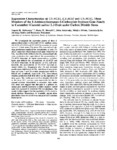Expression Characteristics of CS-ACS1, CS-ACS2 and CS-ACS3, Three Members of the 1-AminocycIopropane-l-Carboxylate Synthase Gene Family in Cucumber {Cucumis sativus L.) Fruit under Carbon Dioxide Stress

View/
Date
1999Author
Mathooko, Francis M.
Mwaniki, Mercy W.
Nakatsuka, Akira
Shiomi, Shinjiro
Kubo, Yasutaka
Inaba, Akitsugu
Nakamura, Reinosuke
Metadata
Show full item recordAbstract
We investigated the expression pattern of three 1-aminocydopropane-1-carboxylate (ACC) synthase genes,
CS-ACS1, CS-ACS2 and CS-ACS3 in cucumber (Cucumis sativus L.) fruit under CO2 stress. CO2 stress-induced ethylene production paralleled the accumulation of only CSACS1 transcripts which disappeared upon withdrawal of
CO2. Cycloheximide inhibited the CO2 stress-induced ethylene production but superinduced the accumulation of
CS-ACS1 transcript. At higher concentrations, cycloheximide also induced the accumulation of CS-ACS2 and
CS-ACS3 transcripts. In the presence of CO2 and cycloheximide, the accumulation of CS-ACS2 transcript occurred within 1 h, disappeared after 3 h and increased greatly upon withdrawal of CO2. Inhibitors of protein kinase and types 1 and 2A protein phosphatases which inhibited and stimulated, respectively, CO2 stress-induced ethylene production had little effect on the expression of these genes. The results presented here identify CS-ACS1 as the main ACC synthase gene responsible for the increased ethylene biosynthesis in cucumber fruit under CO2 stress and suggest that this gene is a primary response gene and its expression is under negative control since it is expressed by treatment with cycloheximide. The results further suggest that the regulation of CO2 stress-induced ethylene biosynthesis by reversible protein phosphorylation does not result from enhanced ACC synthase transcription.
